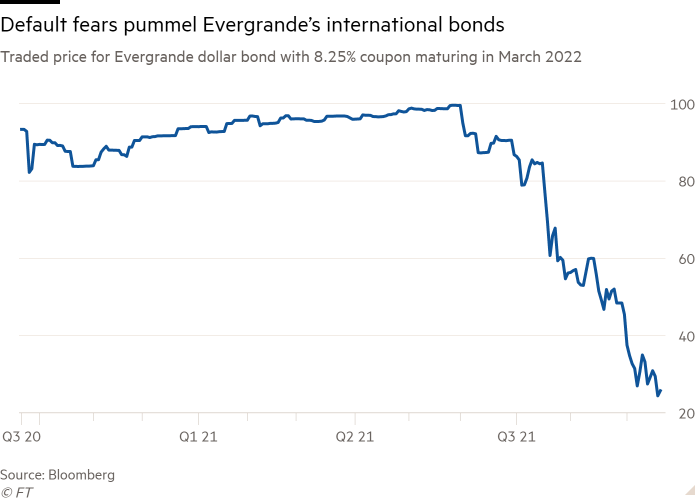Chinese markets fell on their first day of trading this week after a public holiday as concerns grew in global markets over a possible default by property developer Evergrande on an international bond repayment.
But the losses were not as heavy as feared after the real estate company, which has total liabilities of more than $300bn, said payment due on Thursday for an onshore renminbi-denominated bond had “already been resolved through off-exchange negotiations”.
The benchmark CSI 300 index of Shanghai- and Shenzhen-listed shares recovered from an initial dip of almost 2 per cent to close down 0.7 per cent. The CSI 300 Real Estate index rose 5.6 per cent.
Markets in Hong Kong, where Evergrande shares have tumbled almost 85 per cent this year, were closed for a public holiday. But parent company Evergrande Group’s Frankfurt-listed depositary receipts rose €0.06 to about €0.32 in early European trading, reflecting a more than 20 per cent gain for the volatile shares.
Evergrande is due to pay Rmb232m ($35.8m) in interest on Thursday on an onshore bond maturing in 2025.
But the company did not comment on exactly when or how much of that amount it would pay, or whether it would meet an $83.5m payment due the same day for an offshore, dollar-denominated note that matures next year. That bond has traded at about 26 cents on the dollar this week, reflecting expectations of imminent default.

Concern that the company will default on the offshore bond sparked broader tumult in global markets this week, with Wall Street on Monday suffering its worst trading day since May.
Analysts attributed the limited falls for Chinese shares to onshore investors having more time to digest developments around Evergrande, with the last-minute reassurance softening concerns of a default.
“The latest announcement just proves Evergrande and the government’s efforts to stabilise the situation and prevent defaults,” said Bruce Pang, head of research at investment bank China Renaissance. He added that Beijing was much more concerned about onshore defaults and could force issuers and domestic bondholders to negotiate an agreement.
“The government has a greater say on developments with onshore bonds — they can streamline arrangements [with bondholders] and work out payments much more easily than with offshore bonds,” Pang said.
Traders said Evergrande was still likely to miss the Thursday deadline for the payment on the offshore bond, but the company might seek to avoid a formal default with offshore bondholders during a 30-day grace period following the payment deadline.
“They probably will negotiate,” said one investor in Chinese debt of the developer, adding that Evergrande could “still try for a soft landing but negotiate . . . [the] same way as they are with the onshore coupon”.
Additional reporting by Leo Lewis in Tokyo
https://news.google.com/__i/rss/rd/articles/CBMiP2h0dHBzOi8vd3d3LmZ0LmNvbS9jb250ZW50L2QxYTUyMzM1LWJlOTItNDE5MS1hODdlLTJjMGI5ZTVmZDY1ZNIBAA?oc=5
2021-09-22 05:59:05Z
52781886928127
Tidak ada komentar:
Posting Komentar